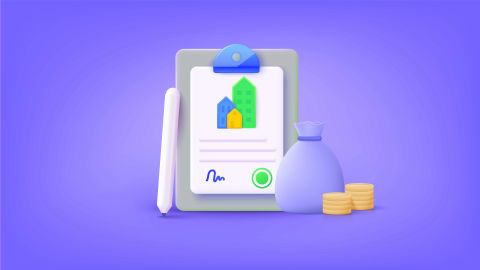Your credit score forms a vital part of your financial profile. It is a 3-digit number assigned to you based on your history with credit or lack thereof. The score ranges between 300 and 900, with anything over 750 considered as ideal. In India, there are a handful of credit scoring agencies and among these, you’ll find that TransUnion CIBIL is the most popular. Thus your credit score is often called CIBIL score.
This score is taken into consideration whenever you apply for credit in any form, be it a loan or a credit card. Typically, having a low score adversely affects your chances of accessing credit on favourable terms or getting approved at all. In such an instance, learning how to improve credit score is a skill that comes in handy. This not only helps you secure funding, but may also allow you to get it on better, more pocket-friendly terms.
Struggling to improve your credit score but need a large loan urgently? A loan against property could be the ideal solution. By pledging your property as collateral, you can secure funds quickly and at competitive terms. This option offers high-value sanctions, even if your credit score isn't perfect. Why wait? Turn your real estate into a financial opportunity today! By using your property as collateral, you can unlock access to large funds of up to Rs. 10.50 crore—it is a smart way to manage your finances with ease!
Now that you’re aware of its importance, take a look at the factors that affect it, how to improve CIBIL score, and how to get a loan with bad credit.
What role does credit score play when borrowing credit?
Your CIBIL score plays a very important role when you’re borrowing credit of any form because it is indicative of your creditworthiness. Lenders analyse your score to assess your financial profile and gauge the risk you pose as a borrower. Having a low CIBIL score indicates a lack of experience with credit or improper credit management. This causes lenders to see you as a high risk, which may lead to an outright rejection.
On the other hand, maintaining a high CIBIL score means that you are consistent with payments and have sufficient experience handling different types of credit. All in all, your credit score is a key deciding factor and determines whether or not you get approved for credit.
If your credit score is holding you back from accessing credit, don’t worry. A Loan Against Property lets you unlock funds using your residential or commercial property. With flexible tenures and low-interest rates, you can get the financial support you need without compromising your plans. Whether it is expanding your business or funding your child's education, our loan against property can help without parting with your asset. Get loan of up to Rs. 10.50 crore against your property within 72 hours* of the approval.
How does credit score calculate?
CIBIL score is calculated by assessing 4 major factors of your financial profile. They are as follows:
- Credit utilisation ratio
- Credit portfolio mix
- Repayment track record
- Amount of existing loans or credit
These factors carry different weightage: Your repayment track record has the highest at 30% and is followed closely by your credit portfolio mix, which makes up for 25%. Similarly, credit utilisation and the number of loans you have make up 25% of your score and other factors like the number of loans and applications comprise the balance 20%. Working on these areas specifically will almost guarantee you the score you desire as it minimises room for error. Facing challenges due to a low CIBIL score? With a loan against property, you can still access funding by leveraging your assets. This type of secured loan not only offers a higher sanction amount but also more favorable terms, giving you the financial edge you need. By using your property as collateral, you can unlock access to large funds of up to Rs. 10.50 crore—it is a smart way to manage your finances with ease! Get funds within 72 hours* of approval.
How to increase credit score?
Learning how to improve credit score is well worth the effort because a subpar score may secure you credit at unfavourable terms. Thankfully, there are a few quick measures you can use to fix a bad score. They are as follows:
- Work towards clearing up all your outstanding debt: Unpaid dues can severely hurt your score and keep it from growing. Employ better financial management and pay off these dues as soon as possible.
- Be consistent with repayments: Ensure that all your credit payments are on time. Missing even a single EMI or credit card bill can cause a dip in your score.
- Check your CIBIL report for errors: Errors in your CIBIL report can keep your score from growing even if you’ve been a good borrower.
- Keep your credit utilisation ratio minimal: Avoid utilising the entire limit available on your credit card. Maintaining a credit utilisation ratio under 35% is healthy and will help you see gains in your CIBIL score.
After learning about the worth of a good credit score you may be asking yourself, ‘How can I borrow money with bad credit?’ This is because certain measures stated above may take some time to put in place, and you may need a loan fast with bad credit in the present. Be careful when you are looking for online loans for bad credit, as sometimes, you may end up paying very high interest if you don’t choose the right lender.
Why let a low credit score dictate your financial decisions? With a loan against property by Bajaj Finance, you can pledge your property and access funds without the hurdles of traditional loans. Enjoy flexible repayment options and quick disbursements to meet your urgent needs. Get a loan of up to Rs. 10.50 crore with the option of interest-only EMIs during the initial tenure.
Benefits of improving credit score
Improving your credit score offers numerous financial advantages. A higher credit score demonstrates financial responsibility and creditworthiness, making it easier to access loans and financial products. Here are key benefits:
- Easier loan approvals: A good credit score increases the likelihood of loan approval, as lenders view you as a reliable borrower.
- Lower interest rates: With a higher credit score, you can qualify for loans at reduced interest rates, saving money over time.
- Higher credit limits: Lenders are more likely to offer higher credit limits to individuals with strong credit scores, providing financial flexibility.
- Better housing options: Landlords and housing agencies often check credit scores, and a higher score can improve your chances of renting or securing housing.
- Quick approvals: Improved credit scores speed up loan and credit card application processing times.
- Financial security: A strong credit score allows better preparedness for emergencies and unexpected expenses by ensuring easier access to credit.
How To Borrow Money With Bad Credit
In order to get a loan with bad credit, you can employ alternate measures like showing substantial financial backup or pledging an asset as collateral. The latter has a higher chance of success and secured borrowing options also offer larger sanctions along with better repayment terms.
Opt for the Bajaj Housing Finance Limited Loan Against Property by pledging any residential or commercial property that you own as security. This will help you get access to a sizable sanction of up to Rs. 10.50 crore*. Further, thanks to the lenient eligibility criteria, you can qualify for this loan even with a less than ideal CIBIL score, so long as other aspects of your finances are in good standing. You can also choose to repay over a flexible tenure up to 15 years and get access to your funds within 72 hours* of the approval.
Check your eligibility for a loan against property with bad CIBIL score, and to get quick access to funding, check your pre-approved offer. This will help you get a tailored deal and enjoy a hassle-free approval online.
Converting feet to yards is an essential skill for many measurement tasks, especially in real estate and construction. By understanding this simple conversion formula, you can handle measurements confidently. If you are planning on upgrading your property or purchasing land, consider using Bajaj Finserv Loan Against Property to finance your plans with ease. With competitive loan against property interest rate options and flexible repayment terms, you can plan better using the loan against property EMI calculator, helping you turn your dream project into reality.
Property loan based on amount
Apply for a loan against property in different cities
DISCLAIMER:
While care is taken to update the information, products, and services included in or available on our website and related platforms/websites, there may be inadvertent inaccuracies or typographical errors or delays in updating the information. The material contained in this site, and on associated web pages, is for reference and general information purpose and the details mentioned in the respective product/service document shall prevail in case of any inconsistency. Subscribers and users should seek professional advice before acting on the basis of the information contained herein. Please take an informed decision with respect to any product or service after going through the relevant product/service document and applicable terms and conditions. In case any inconsistencies observed, please click on reach us.
*Terms and conditions apply








